All products featured are independently chosen by us. However, SoundGuys may receive a commission on orders placed through its retail links. See our ethics statement.
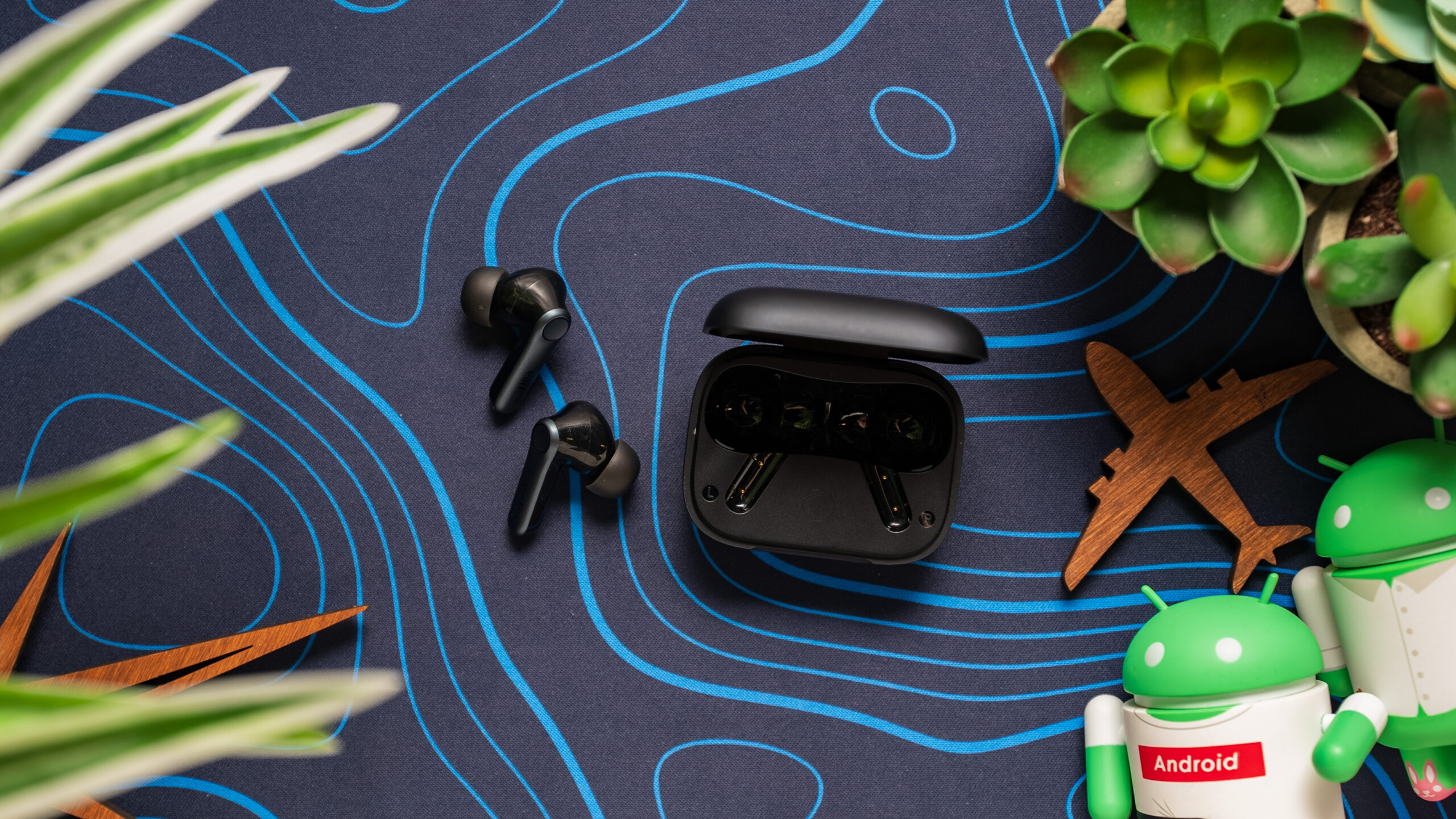

EarFun Air Pro 4 review
Published onDecember 16, 2024


EarFun Air Pro 4
The EarFun Air Pro 4 promise a lot of features typically only found on premium wireless earbuds for a fraction of the price. Is it too good to be true, or do these deserve a spot amongst the best earbuds under $100? Find out in our EarFun Air Pro 4 review.
Editor’s note: This article was updated on December 16, 2024, to include our video review of the EarFun Air Pro 4.
The EarFun AirPro 4 are for anyone seeking feature-packed earbuds that don’t break the bank.
What’s it like to use the EarFun Air Pro 4?
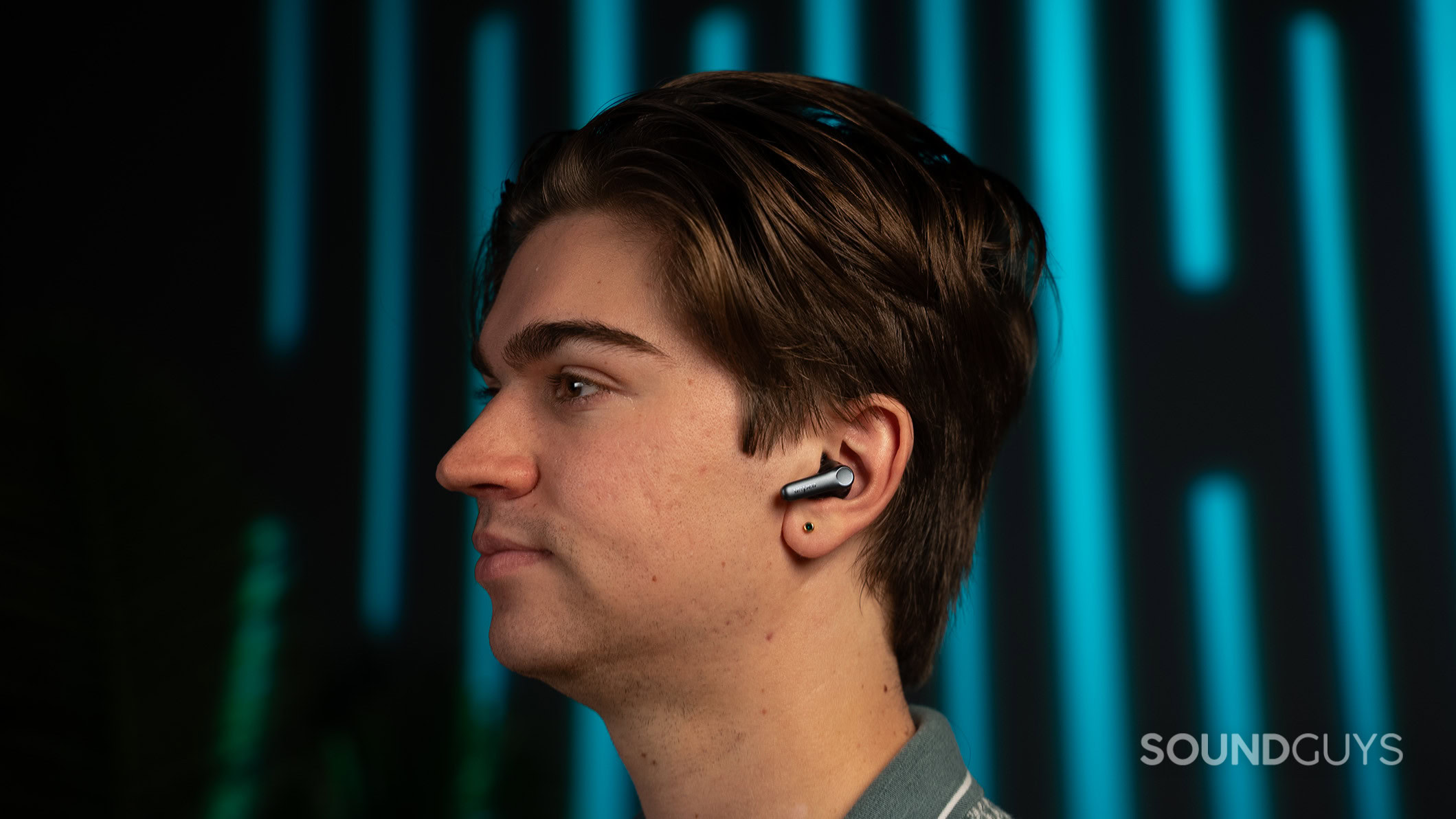
On the surface, the EarFun Air Pro 4 look identical to their predecessor, the EarFun Air Pro 3. That’s not necessarily a bad thing, as this is a very lightweight design that I can wear comfortably for hours at a time. There are five different sizes of silicon ear tips included, so you shouldn’t have trouble attaining a good fit. The earbuds also still have IPX5 water resistance, so I wasn’t worried about wearing the EarFun Air Pro 4 out in the rain and at the gym.
While the external design may look similar, look under the hood, and you’ll find the EarFun Air Pro 4 has some major internal upgrades. You get the latest Bluetooth technology, new drivers, and improved noise canceling, amongst a slew of other minor features and performance upgrades. All put together, the EarFun Air Pro 4 holds a package of features rarely found on earbuds this cheap.
The EarFun Air Pro 4 have optional in-ear detection to automatically pause your music when you take an earbud out, and resume when you put the earbuds back on. Convenience features like this help create a seamless user experience, something typically only found on much more expensive wireless earbuds. You can access the tap controls on either the left or right earbud for full control of music, voice assistant, and noise canceling.
The EarFun Air Pro 4 have tap controls that you can fully customize from within the EarFun Audio app. By default, a single tap of either earbud impacts volume. I found this annoying as every time I adjusted the earbuds in my ear, it would adjust the volume. If you’re like me, you may just want to turn single tap functionality off.
| Input | Left earbud | Right earbud |
|---|---|---|
| Input Single tap | Left earbud Volume down | Right earbud Volume up |
| Input Double tap | Left earbud Play/pause | Right earbud Play/pause |
| Input Triple tap | Left earbud Previous track | Right earbud Next track |
| Input Tap and hold | Left earbud Noise control | Right earbud Voice assistant |
Should you use the EarFun Audio app for the EarFun Air Pro 4?
The EarFun Audio app contributes a ton of features to the EarFun Air Pro 4 experience. You get the companion app basics such as battery information and firmware updates, but once you dive into the app you’ll be surprised by how many features are here. You can select from two Ambient Sound modes, and five ANC modes (more on that later). You can also tweak the controls to your liking, and enable a low-latency streaming mode for gaming. If you lose an earbud, head to the Find headphones section of the app to play a tone out of your lost earbud.
To adjust the way the earbuds sound, you can head to the EarFun Equalizer. Here, you can select from a whopping 30 EQ sound presets, or create your own using the 10-band custom equalizer. If you aren’t sure how to use an equalizer, click on “My Sound Profile” to conduct a hearing test that will build an EQ preset for your ears. With all these customization options, the EarFun Audio app has pretty much everything I could want in an earbud companion app.
It took 3 minutes and 47 seconds to upgrade to firmware version 0.2.7, which is about average.
How do the EarFun Air Pro 4 connect?
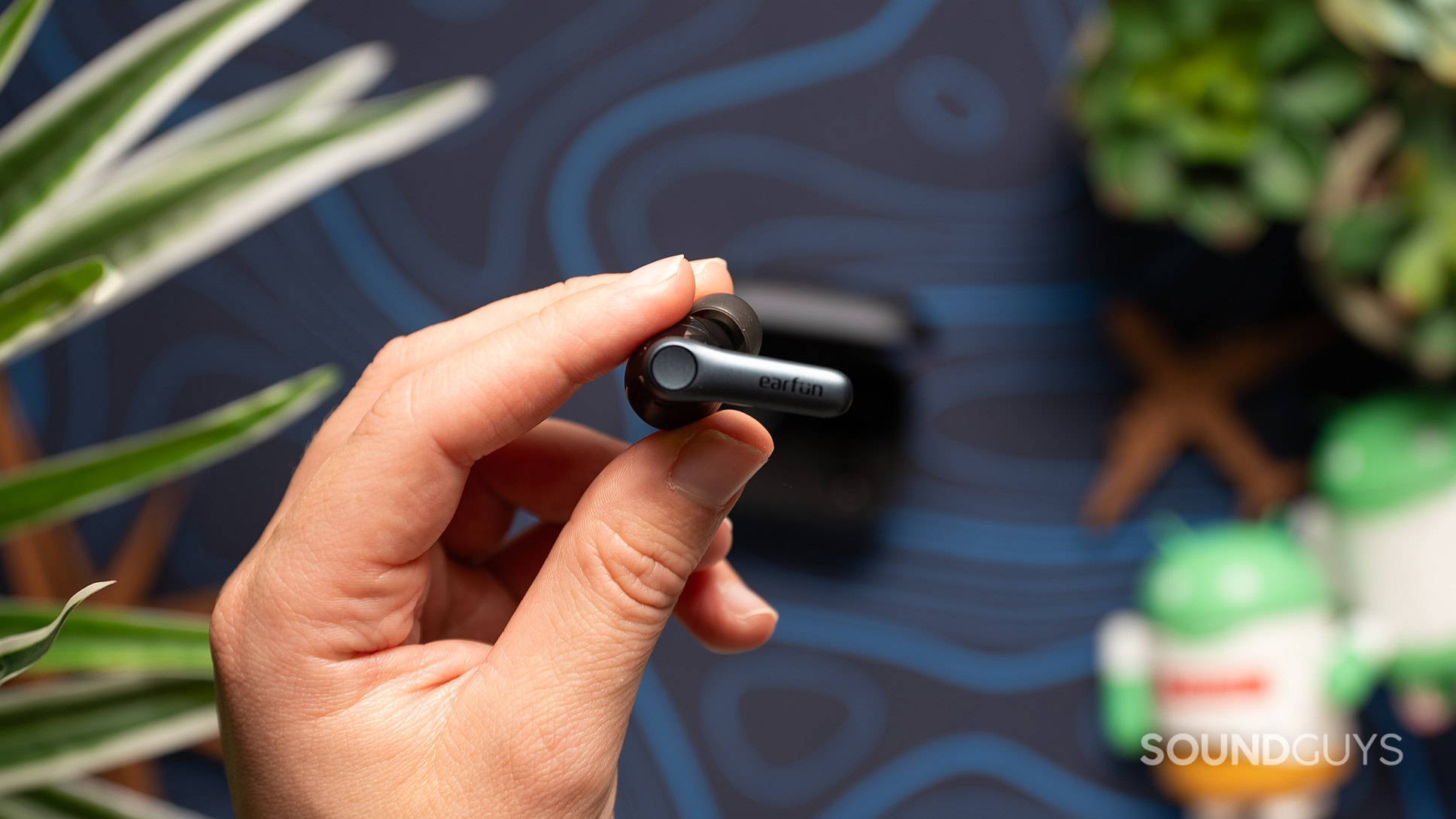
The EarFun Air Pro 4 have the latest and greatest in Bluetooth technology, which is exceptionally rare at this price point. You get Bluetooth 5.4 with a wide array of Bluetooth codecs including aptX Lossless, LDAC, AAC, and SBC. Those with an Android phone that supports high-res codecs can profit from some seriously great streaming quality.
There’s also support for Google Fast Pair for instant pairing, and Bluetooth Multipoint to connect to two devices such as a phone and laptop at the same time. I used the EarFun Air Pro 4 with my iPhone and Macbook and didn’t experience any connection stutters or dropouts.
You can pair the EarFun Air Pro 4 to any device by following these steps:
- Ensure the earbuds and case are charged.
- Place the earbuds inside the charging case and open the case.
- Press and hold the button on the case for three seconds.
- Select the EarFun Air Pro 4 from within your Bluetooth settings on your device.
If you are having troubles with your EarFun Air Pro 4, resetting them is a good first step in the troubleshooting process. To reset your earbuds:
- Place the earbuds inside the charging case.
- Remove the earbuds from your list of connected devices on your phone.
- Press and hold the button on the case for eight seconds until the lights rapidly flicker.
- Now that the earbuds have been reset, you can pair the earbuds to your phone again.
How long does the EarFun Air Pro 4 battery last?
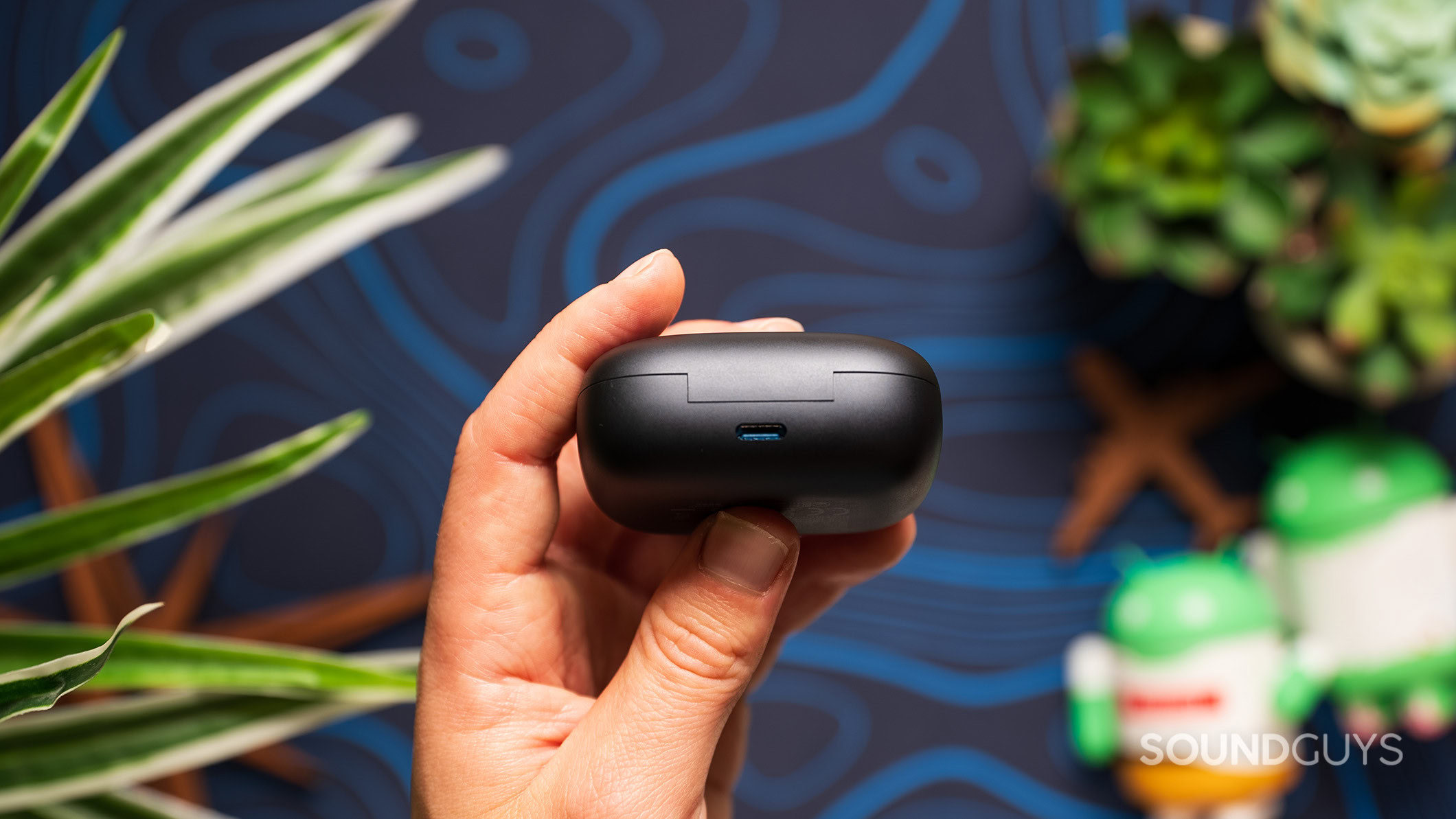
In our battery test, the EarFun Air Pro 4 lasted 8 hours and 44 minutes, which is above average for wireless earbuds. The charging case provides a few extra charges, with EarFun claiming you can get up to 41 hours of total playback time. You can charge the case with the included USB-C cable, or wirelessly with a Qi charging mat, which is a nice perk.
Yes, EarFun says that 10 minutes of charging the Air Pro 4 can provide 2 hours of playback time.
How well do the EarFun Air Pro 4 cancel noise?
Loading chart ...
Finding wireless earbuds under $100 with noise canceling, let alone good noise canceling, is a challenge. It’s one of the major areas that the previous generation EarFun Air Pro 3 fell short in our testing. Thankfully, the Air Pro 4 bring some major upgrades in this department.
The improved ANC now blocks out 10-20dB of additional noise compared to passive isolation from the ear tips alone. When ANC is set to its highest setting of “Strong ANC”, it reduces the loudness of external noise by an average of 75%. While this isn’t quite as good as the best noise canceling earbuds, it is still a very noticeable attenuation that is helpful when using the earbuds in a noisy environment such as on a bus.
In addition to the default “Strong ANC,” there are four other noise canceling modes to check out. The “Balance ANC” mode is just a weaker version. “AI Environment Adaptive ANC” automatically adjusts the strength of the ANC depending on the level of noise around you, while “AI Ear Adaptive ANC” adjusts based on the amount of noise reaching your ear canal. Finally, there is a “Wind noise cancellation” mode that is ideal for jogging on windy days. As someone who wants to hear nothing but their music, I prefer the “Strong ANC” mode, but you can experiment with the other modes if you don’t like the feeling of powerful noise canceling.
If you want to stay aware of your surroundings, there are two different Ambient Sound modes to check out in the EarFun Audio app. The “Default” mode provides the strongest boost to ambient noise, making sounds even louder than if you weren’t wearing the earbuds. On the other hand, the “Natural” mode provides less of a boost, similar to if you weren’t wearing the earbuds.
How do the EarFun Air Pro 4 sound?
I’m impressed by the sound quality of the EarFun Air Pro 4. The earbuds sound good out of the box, though you can also tweak the sound quality to your liking using the app equalizer.
Multi-Dimensional Audio Quality Scores (MDAQS)
The chart below shows how the sound of the EarFun Air Pro 4 was assessed by the Multi-Dimensional Audio Quality Score (MDAQS) algorithm from HEAD acoustics.
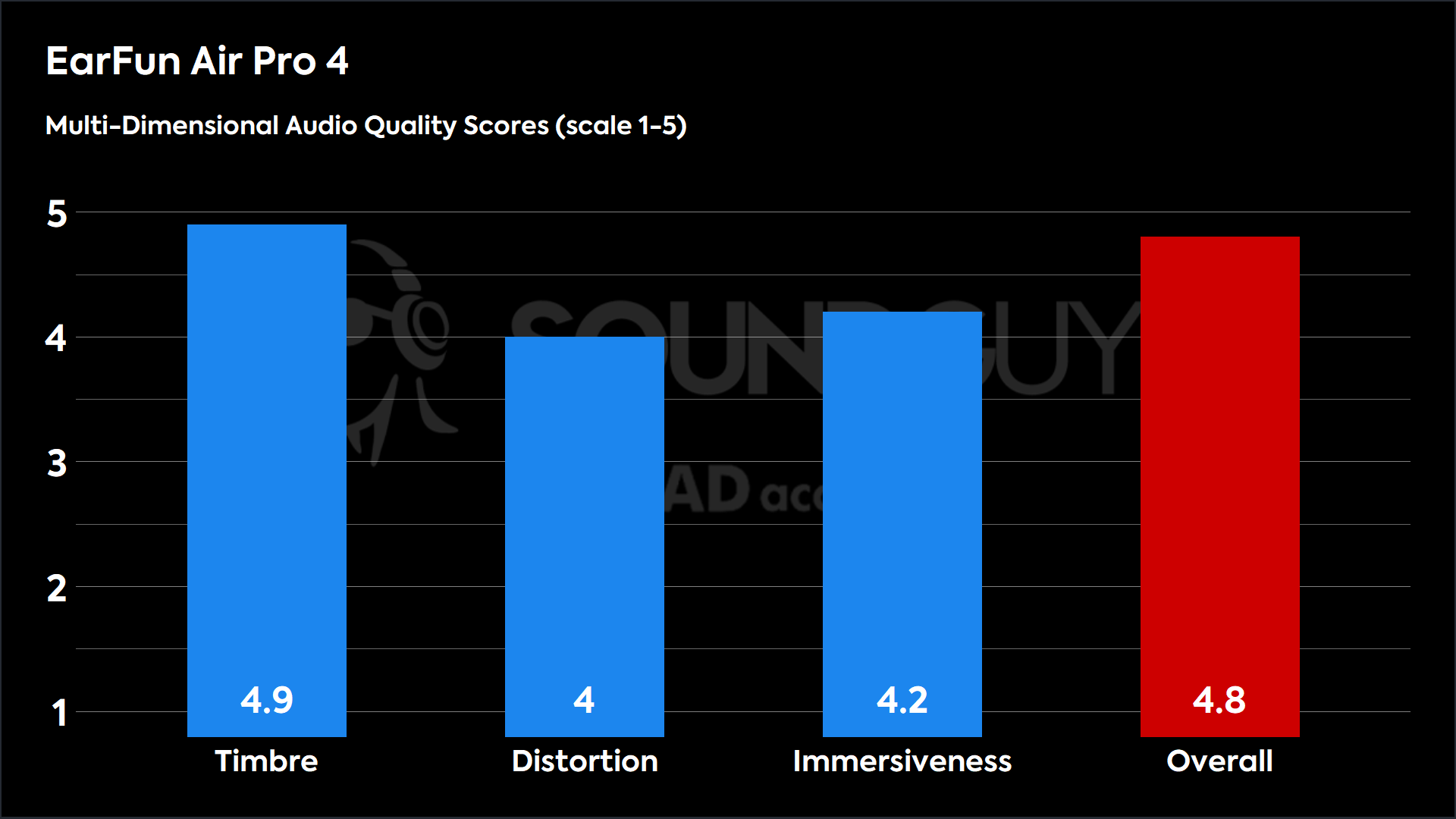
While the EarFun Air Pro 3 struggled with distortion, that’s not the case here. The EarFun Air Pro 4 achieve great scores across the board from a simulated panel of listeners. This means there is a high chance that you will enjoy the sound quality of the EarFun Air Pro 4.
Timbre (MOS-T) represents how faithfully the headphones reproduce the frequency spectrum and temporal resolution (timing information).
Distortion (MOS-D) represents non-linearities and added noise: higher scores mean cleaner reproduction.
Immersiveness (MOS-I) represents perceived source width and positioning: how well virtual sound sources are defined in three-dimensional space.
See here for an explanation of MDAQS, how it works, and how it was developed.
Reviewer’s notes
Editor’s note: this review uses a hover-enabled glossary to describe sound quality based on a consensus vocabulary. You can read about it here.
Objective Measurements
Loading chart ...
The frequency response of the EarFun Air Pro 4 closely follows our headphone preference curve, aside from a dip in the highs around 8-11kHz. If you find that cymbals and other high-frequency sounds are too quiet for your liking, try boosting the 8khz slider in the custom equalizer in the app.
Since there are 30 different EQ presets, we won’t bog you down with all of them, but we will show you how a few of them impact the frequency response of the EarFun AirPro 4. There are three different levels of boost/reduce presets, we chose the strongest version of all of them to demonstrate the extent the EQ presets will impact the frequency response.
Bass Boost 3 EQ Preset
Loading chart ...
If you like bass, you’ll be happy to know that the Bass Boost 3 preset significantly amplifies low-frequencies.
Treble Boost 3 EQ Preset
Loading chart ...
If you want more detail in the highs, you can try out the Treble Boost preset. If you are comfortable using the custom equalizer, we recommend trying that out so you don’t over-emphasize the frequencies that are most sensitive to human ears.
Bass Reducer 3 EQ Preset
Loading chart ...
If you find the earbuds have too much bass, you can use the Bass Reducer presets to cut back on low-frequencies.
Treble Reducer 3 EQ Preset
Loading chart ...
The Treble Reducer presets seem to have little impact on reducing high-frequencies. You are better off using the custom equalizer.
Loading chart ...
Disabling noise canceling has a measurable impact on sound quality. All frequencies below 500Hz sound quieter with ANC turned off compared to when it is on. If you don’t plan on using noise canceling, you’ll likely want to reconcile this using the custom equalizer.
Can you use the EarFun Air Pro 4 for phone calls?
The EarFun Air Pro 4 have six onboard microphones with a new AI algorithm to block out background noise. While we find the microphones accurately pick up the voice in quiet environments, they still aren’t ideal for taking calls in noisy environments. You can listen to our microphone demonstrations below and let us know what you think.
EarFun Air Pro 4 microphone demo (Ideal conditions):
How does the microphone sound to you?
EarFun Air Pro 4 microphone demo (Office conditions):
EarFun Air Pro 4 microphone demo (Street conditions):
EarFun Air Pro 4 microphone demo (Windy conditions):
EarFun Air Pro 4 microphone demo (Reverberant space):
The EarFun Air Pro 4 offer a modest improvement over their predecessor when it comes to taking calls in windy and street conditions. You can still hear pretty much all the simulated office noise, but at least you can also still make out what the voices are saying, which is better than some budget earbuds.
Should you buy the EarFun Air Pro 4?
Yes, the EarFun Air Pro 4 are a worthy purchase for pretty much anyone seeking budget earbuds. It is very rare to find this combination of great sound, good noise canceling, and comprehensive features at an affordable price.
I have to really nitpick to find faults in the EarFun Air Pro 4, such as the fact the earbuds sound slightly different when you disable noise canceling. At this price though, you really can’t complain.

What should you get instead of the EarFun Air Pro 4?
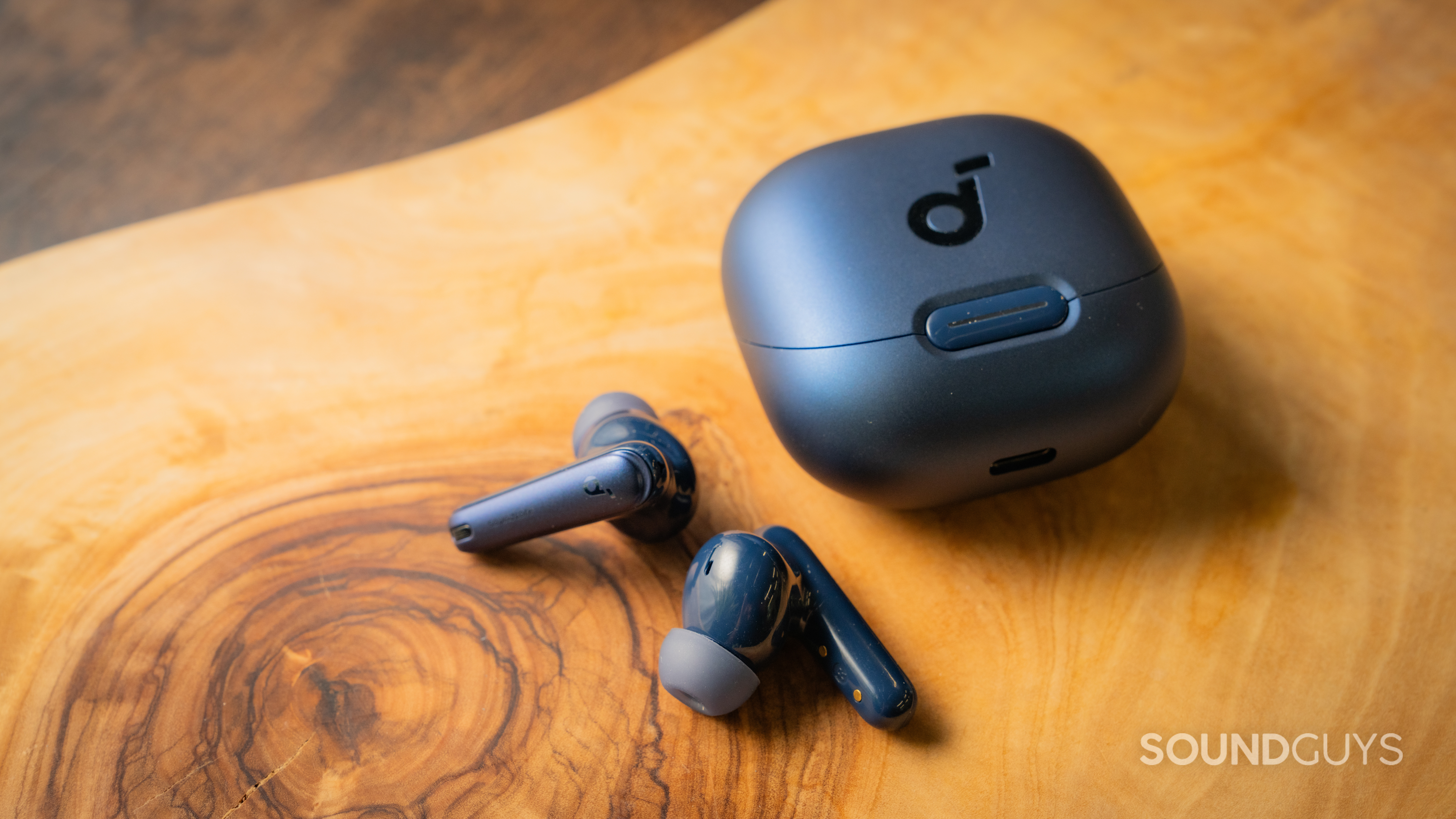
If you look hard enough, you can find some diamonds in the rough in the wireless earbud market under $100. The Anker Soundcore Liberty 4 NC are worth checking out, $99.99 at Amazon. They have a starting price slightly higher than the EarFun Air Pro 4, but you may be able to find them on sale for around the same price. With a very similar set of features, you can’t go wrong with either option.
If you’re on a tighter budget, you can find some decent options under $50, though you’ll have to make some compromises. The Edifier TWS1 Pro 2 ($49.99 at Amazon) have a lot of features and good noise canceling, but poor battery life and mediocre sound quality. The Moondrop Space Travel ($24.99 at Amazon) are ultra-budget earbuds with good sound quality and noise canceling, but are lacking in features.
Frequently asked questions
Yes, I found the EarFun Air Pro 4 work great with my iPhone. You don’t get access to advanced Bluetooth codecs like LDAC and aptX, but I didn’t experience any connection issues.
The EarFun Air Pro 4 are water-resistant, but not waterproof. You should not fully submerge them in water.
Yes.
Yes, the EarFun Air Pro 4 have Bluetooth Multipoint to pair to two devices at the same time.
Yes, you can pair the EarFun Air Pro 4 to any Bluetooth device.